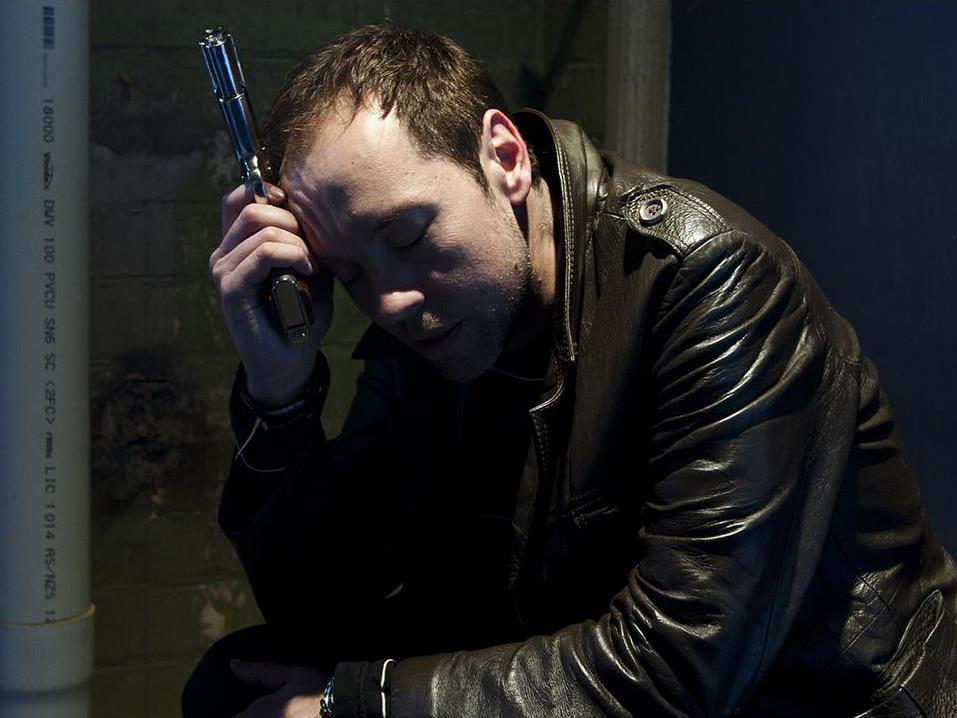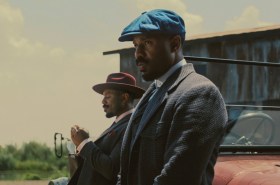‘You’re lucky to be alive,’ is a phrase that most people are all too happy to hear. Often uttered by a doctor or a police officer to someone who has narrowly survived a potentially tragic fate, it becomes a badge of honour, a reason to gain a new lease on life, and a reminder of how fleeting human existence really is. For the scarred, mild-mannered Percival (Leon Cain, Mental), the five words echo through his mind as an indictment of his failure, rather than a statement of his good fortune. He doesn’t want to be told about the kind hand destiny has offered him. He doesn’t want to be able to be told anything.
That’s part of the tale that director Dru Brown (Sleeper) relates in his sophomore feature The Suicide Theory; and yet, as the title suggests, there’s another idea at play as well. As a suicidal man who has been unable to kill himself thus far, Percival has conjured a few thoughts on just why he can’t end his own life, and why professional assassin Steven (Steve Mouzakis, Downriver) is the right man to take him out instead. The latter has his own issues, including a penchant for violence, unrelenting grief over the loss of the woman he loves, a waning desire to ply his deathly trade, and a growing yearning to form a friendship with his new client. Alas, as much as the aforementioned elements complicate his choices, the former’s offer is simply too lucrative.
Accordingly, The Suicide Theory becomes a hitman thriller that’s as concerned with contemplative questions as it is with plot mechanics. From the expositional dialogue to the frequent use of flashbacks, every scene and exchange is loaded with details designed to keep the story progressing towards its obvious conclusion while stressing broader existential concerns. Percival keeps telling Steven that there’s a reason that their paths have crossed, and that they continue to intersect despite shootings and smotherings trying to ensure otherwise. The repetitive revelation shouldn’t come as a surprise to watching viewers; that the duo’s intertwined journeys are the entire point of writer Michael J. Kospiah’s (short The Dead Guy in the Trunk) screenplay is made abundantly apparent.
Indeed, the more twists that arise — and the more predictable each turns out to be — the less persuasive The Suicide’s Theory‘s musings on fate prove, even more so when the film tries to thread its multiple strands together for the big finale. The majority of narrative choices seethe with convenience and contrivance; however watching how Cain and Mouzakis construct their protagonists and convey their decisions still remains complex and compelling. Beneath the feature’s layers of ostensible cleverness sits two fine-tuned performances that get to the heart of struggling with life’s disappointments, with Mouzakis particularly astute at exploring internal conflict in little more than a change in his glance and a flicker in his tone. His calculated killer may never become wholly sympathetic, but he is relatable and accessible.
In fact, it’s the type of turn any filmmaker would be lucky to build a feature around, as Brown clearly recognises. Bearing the slickly shot, grittily staged hallmarks of genre fare, he offers confident aesthetics that match and enhance the central portrayal — even if both the look of the movie and the acting contained within outperform the storyline. Brown also litters splashes of black comedy throughout the pervading tone of pensive suspense to great aplomb, and turns one of the most awkward sections of the tale, regarding Steven’s reaction to Percival’s sexuality, into a more thoughtful character-defining moment than it first appears. His efforts smack of talent, and of toiling valiantly to do justice to conceptually intriguing yet not completely convincing material.
Rating: 2 ½ stars out of 5
The Suicide Theory
Director: Dru Brown
Australia, 2014, 98 mins
Vision Splendid Outback Film Festival
visionsplendidfilmfest.com
June 24 – July 2, 2016
Actors:
Director:
Format:
Country:
Release:





